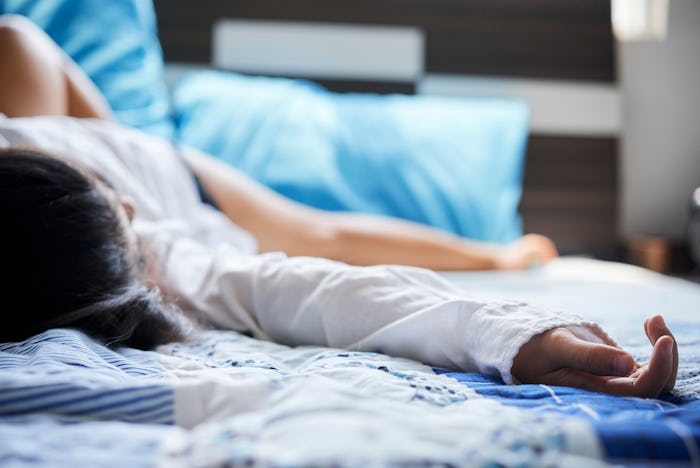Remember back in sex ed, when your teachers taught you about how best to tend to your sexual needs, how to find your own clitoris, and the health benefits of getting to know yourself sexually? No? Me neither: my high school sex ed experience could be summed up as, “Don’t have sex, or you’ll get an STD and die. Now here’s a cartoon Herpes virus who’s here to talk to you about the disgusting disease-ridden world of sex (which you shouldn’t be having).” Needless to say this kind of talk didn’t really engender many questions like, “Hey, can girls masturbate? Is it healthy? Can masturbation help with mood? Does it have benefits?”
Even as adults, masturbation, particularly for women, is rather taboo to talk about, and it’s often considered a “guilty pleasure.” Luckily, times have changed somewhat, and masturbation isn’t regarded as “harmful,” but I wanted to reach out to expert sources on whether masturbation is actually helpful.
I know, I know. I can hear your collective “Duhs,” but I’m not only talking about “mood” in terms of sexual pleasure; rather, I'm talking about overall psychological well-being. I spoke to Dr. Shannon Chavez, a psychologist and sex therapist, who is an educator about sexual health and wellness. And though I suspected there were positive benefits to masturbation, I was rather surprised by the many, unexpected ways that Dr. Chavez suggests it can help bolster mood and quality of life.
First, there are the physical effects that help de-stress. “Masturbation can lead to pleasurable sensations and orgasms that boost mood and release tension in the body,” Dr. Chavez explains. This is especially true of cramps and pain associated with your period, Dr. Chavez argues: “It’s one of the best pain relievers by helping to alleviate menstrual cramps, headaches, and aches and pains in the body by releasing endorphins that make us less sensitive to pain.” In fact, researchers have found that masturbation helps improve symptoms of dysmenorrhea (painful periods), according to a review in the journal Sexual and Relationship Therapy.
Masturbation can also help improve the balance of neurotransmitters in the brain. Dr. Chavez tells me, “It releases feel good chemicals in the brain — dopamine and oxytocin — that are responsible for desire and reward and motivation towards more pleasurable activities.” You could consider masturbation as an all-natural (or au naturel, whatever you prefer) way to boost your brain chemicals. “It is a natural high that makes you feel good all over and relieves stress,” says Dr. Chavez.
There’s even the potential for masturbation to help with your Monday mood and your work-related blues, according to Dr. Chavez: “Studies show that orgasm can increase your math and speaking abilities. I always recommend that my clients masturbate or engage in sexual activity before a big presentation at work or before solving a problem. It even removes creative blocks. It helps you think clearer and focus.” And honestly, what sounds more fun: coffee, or a little you-time (or both, hey, I’m not judging).
There are also some effects of masturbation that not only help with your mood, but your overall health and life-satisfaction. One such benefit is helping you sleep: “An orgasm before bed can be a powerful sleep aid,” says Dr. Chavez. Planned Parenthood also extolled the virtues of a bit of bedtime introspection. Their website says, “Masturbation can lower stress and help you relax. It even helps some people fall asleep.” And according to the Division of Sleep Medicine at Harvard Medical School, sleep and mood are closely linked: “Studies have shown that even partial sleep deprivation has a significant effect on mood.” So a little nightcap of masturbation could go a long way to improve your outlook.
There are also long-term benefits to masturbation that can help improve your overall mental welfare. Dr. Chavez talks about how it can amp up your romance: “Longer term psychological benefits are sexual satisfaction and boost in sexual interest. The easier it is to get aroused and know what you want, the more you will feel confident expressing that to a partner, especially for women.” She believes masturbation can help empower people during their sexual encounters, especially women: “I encourage women to masturbate to be in control of their own orgasm. No one gives it to you. You give it to yourself. A partner participates in your pleasure and isn’t in control of it.”
Finally, making yourself feel good can make you feel good about yourself. “[Masturbation] improves self-esteem. You get over your sexual hangups and genital shame by exploring and feeling confident in your body,” Dr. Chavez says. It can also be a self-care routine that boosts your confidence, and your inner health. “It also improves blood flow and circulation which not only makes your skin look great and your heart healthier, but it helps to improve your orgasm response over time,” Dr. Chavez explains. So the next time you want to give yourself a little self-love, don’t feel sheepish: you’re not only giving your brain and body a gift, but a gift that keeps on giving.
